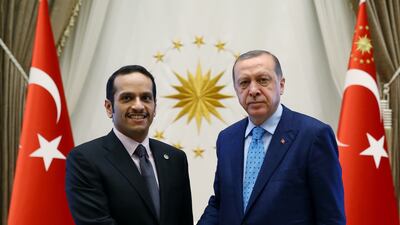President Recep Tayyip Erdogan is to visit three Gulf states in the hope of de-escalating the seven-week impasse between Qatar and four other Arab nations, including the UAE.
But the trip also presents another challenge for the Turkish president: trying to balance Turkey's conflicting interests in the region as tensions continue to rise in the Qatar crisis.
President Erdogan is scheduled to visit Saudi Arabia, Qatar and Kuwait on July 23, the latest to pass through what is fast becoming a revolving-door of diplomacy.
The trip is viewed as sending mixed signals to the region. Mr Erdogan supported Qatar in its dispute with its neighbours and criticised the demands issued by the four boycotting countries as a prerequisite for ending the sanctions on Doha. One of the demands was the closure of the Turkish military base in Qatar, which Mr Erdogan said was “disrespectful against Turkey.”
Doha rejected the demands, and insisted that hosting the foreign base - the only Turkish military presence in the region - was Qatar's sovereign right. On Monday, Turkey's defence minister said that sovereignty must be "protected."
That demand - one of 13 issued by Saudi Arabia, the UAE, Egypt and Bahrain on June 22 - is likely to be the focus of talks and a source of contention between Mr Erdogan and Saudi officials in the meeting next week.
“The matter of the Turkish military base in Qatar and Turkey’s security commitments appear to be a red line for president Erdogan who ruled out any negotiations on that with third countries,” said Turkish author Abdullah Bozkurt, who is president of the Stockholm Centre for Freedom.
Neither Saudi Arabia nor its three partners in the boycott is likely to back down on the demand that Qatar expel Turkish forces, since they regard Ankara's closer ties with regional arch-enemy Iran as a potential threat to Gulf stability.
Although Turkey maintains that the military deployment stems from a 2014 agreement, the decision to send troops to Qatar was rushed through the Turkish parliament within days of the crisis beginning on June 5. The base currently holds 150 Turkish troops but has the capacity to hold 5,000 and continues to deploy dozens of commandos despite tensions in the region.
“From the start of this latest crisis with Qatar, President Erdogan has been clear on both his desire to see the crisis de-escalate but also to stand by Qatar's side,” said Ziya Meral, a researcher specialising in Turkey and the Middle East. “However, the latter undermines the former and Turkey's own tensions with the key countries behind the reactions to Qatar limits Turkey's mediation role.”
Mr Meral said Turkey is facing similar issues to Qatar's in that it “desires to be a major player in the region” causing tensions in their support for the Muslim Brotherhood.
Gulf countries view the brotherhood as a major transnational threat to regional stability and have accused Qatar - and, more obliquely, Turkey - of supporting the terrorist organisation.
The four Arab countries have demanded that Qatar cut ties to the Muslim Brotherhood and stop financing terrorist groups in the region. Turkey fears that if Qatar were to buckle under pressure from its Gulf neighbours, those countries would then turn their attention to Ankara's alleged support for the Muslim Brotherhood's.
Although Turkey maintains close diplomatic and economic ties with the Gulf countries, its loyalty is often perceived as fluid, switching back and forth, dependent on what best serves its interests.
The Gulf region's relationship with Qatar has often reflected that uncertainty, allowing Turkey to forge loose relationships with Iran and opposition groups in the Gulf.
However, Ankara is wary of committing too much to one side or the other. As well as relying on the region for energy, Gulf investment has been essential to Turkey's economic growth over the last decade.
The four countries boycotting Qatar are set to meet in Manama to decide the next step in the worst diplomatic crisis since the formation of the Gulf Cooperation Council in 1982.

